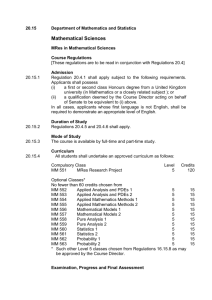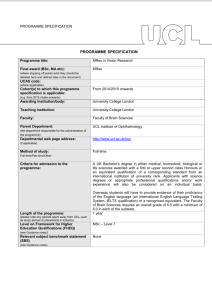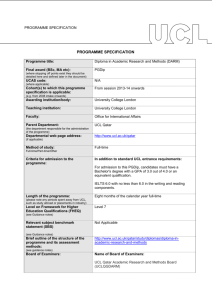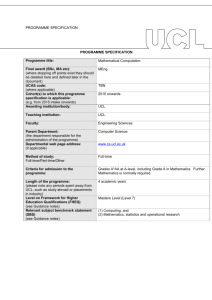MRes Modelling Biological Complexity
advertisement
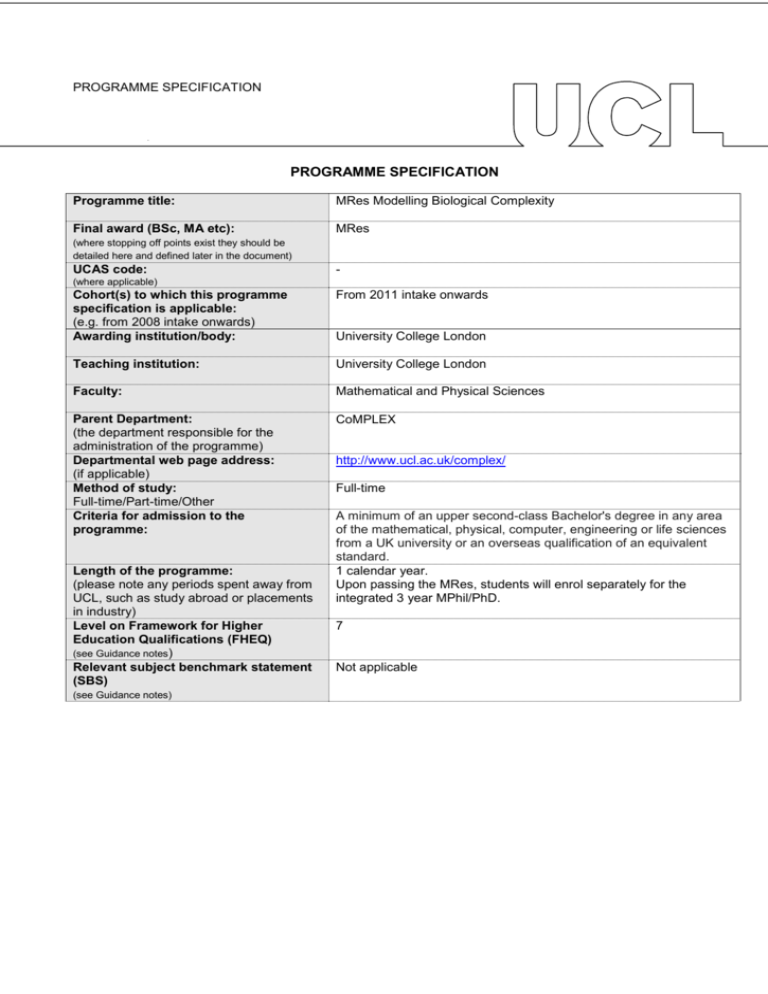
PROGRAMME SPECIFICATION PROGRAMME SPECIFICATION Programme title: MRes Modelling Biological Complexity Final award (BSc, MA etc): MRes (where stopping off points exist they should be detailed here and defined later in the document) UCAS code: - (where applicable) Cohort(s) to which this programme specification is applicable: (e.g. from 2008 intake onwards) Awarding institution/body: From 2011 intake onwards Teaching institution: University College London Faculty: Mathematical and Physical Sciences Parent Department: (the department responsible for the administration of the programme) Departmental web page address: (if applicable) Method of study: Full-time/Part-time/Other Criteria for admission to the programme: CoMPLEX Length of the programme: (please note any periods spent away from UCL, such as study abroad or placements in industry) Level on Framework for Higher Education Qualifications (FHEQ) (see Guidance notes) Relevant subject benchmark statement (SBS) (see Guidance notes) University College London http://www.ucl.ac.uk/complex/ Full-time A minimum of an upper second-class Bachelor's degree in any area of the mathematical, physical, computer, engineering or life sciences from a UK university or an overseas qualification of an equivalent standard. 1 calendar year. Upon passing the MRes, students will enrol separately for the integrated 3 year MPhil/PhD. 7 Not applicable Brief outline of the structure of the programme and its assessment methods: (see guidance notes) Board of Examiners: Professional body accreditation (if applicable): All modules are compulsory and total 180 credits. The programme consists of a Foundation Courses module (non-credit bearing), Transferable & Generic Skills module – 20%, a Mini-project module (consisting of 3 x 5,000 word, 6-week projects) 40%, and a Summer Research Project (dissertation) of 15,000 words – 40%. The Foundation Courses form the interdisciplinary foundation which is required to undertake the latter two components. Transferable & Generic Skills also includes some practical tasks and presentations. An end of year viva is also used to assist in verifying marks at the Exam Board. Further information can be found here: http://www.ucl.ac.uk/complex/currentstudents/mres i) Name of Board of Examiners: Board of Examiners in Modelling Biological Complexity Not applicable Date of next scheduled accreditation visit: EDUCATIONAL AIMS OF THE PROGRAMME: The MRes in Modelling Biological Complexity is designed for students who wish to develop the skills to apply mathematical, computational and physical science techniques to tackle the challenges arising from complexity in biology and medicine. The MRes year is part of an integrated four year MRes + MPhil/PhD programme. Foundation courses provide essential background knowledge in mathematical, computational and physical techniques and a broad introduction to core biological concepts and systems. A range of interdisciplinary researchdriven projects follow in which students gain experience of different research techniques and a range of areas of biological interest. The programme provides students with a broad overview of cutting edge research at the interface of the life and mathematical and physical sciences, where students are strongly encouraged to select projects from a wide choice and range of research topics, to gain a full understanding of the field. The programme is delivered through a combination of lectures, laboratory work, mini-projects, seminars, tutorials and project work. The emphasis in the taught component of the programme is on hands-on learning and tutorialstyle dialogue between students and lecturers. Transferable skills will be gained through dedicated practical courses, web development, oral and poster presentations, a reflective essay, referee report and a seminar series. Teaching and project supervision is provided by active scientists who are leaders in their field; students undertake a range of interdisciplinary research projects that involve collaboration between supervisors drawn from UCL departments within the Faculties of Brain Sciences, Engineering, Medical Sciences, Population Health Sciences, Social and Historical Science, Life Sciences and Mathematical and Physical Sciences. Each project has dual supervision with one supervisor from the mathematical/physical sciences and the other from life and medical sciences. The research carried out addresses biological complexity. Research is organised into themes across the biological scales: - Biomolecular mechanisms - Evolution and dynamics of populations - Integration of cellular function - Interdisciplinary cardiovascular research - Physiological and neural systems - Systems biology. This diversity exploits the unique breadth of research strength at UCL, which allows us to offer challenging research projects both within and across the scales of biological organisation. The training experience offered meets the UK need, both in industry and academia, for outstanding graduates able to apply mathematical, computational and physical science techniques to real biological problems. CoMPLEX supports the research of over 200 scientists who are drawn from more than 30 departments and institutes across UCL. It provides innovative teaching methods for interdisciplinary research, and maintains strong links with universities internationally and with leading UK research centres. The programme aims to provide students with the necessary interdisciplinary skills to undertake the interdisciplinary PhD and a career in research. The course also provides an excellent training towards related careers in areas requiring critical appraisal of complex data, such as science policy analysis, statistical and mathematical consultancy, or in management and the financial sector. PROGRAMME OUTCOMES: The programme provides opportunities for students to develop and demonstrate knowledge and understanding, qualities, skills and other attributes in the following areas: A: Knowledge and understanding Knowledge and understanding of: Essential concepts and scientific method in both mathematics, physical and life sciences. The application of mathematical, computational and physical science techniques to real biological problems. Teaching/learning methods and strategies: Lectures, practical laboratory work, case presentations and seminars delivered by active researchers who are leaders in their field, further details of taught content (Foundations Courses) can be found at: http://www.ucl.ac.uk/complex/currentstudents/mres Extensive research project work carried out by students under the supervision of highly qualified active researchers. Assessment: Three Research Mini-projects and a Summer Project of original research carried out by the student. Students are also assessed on an oral presentation and a viva based on the summer project to assess their understanding of interdisciplinary research. The three, six-week Mini-projects on interdisciplinary work are set by two scientists: one from life/medical sciences and the other from mathematical/physical sciences. The Summer project is a three-month interdisciplinary project, which may be theoretical or practical and must demonstrate evidence of substantial original interdisciplinary research and thinking. B: Skills and other attributes Intellectual (thinking) skills: Ability to disseminate complex data and concepts, critical thinking, problem solving, creativity. Teaching/learning methods and strategies: Intellectual skills are developed throughout the course. Students will develop the skills during the extensive research components of the course, as well as presenting their work and commenting on others during the CoMPLEX Journal Club. Assessment: Intellectual skills are required for the successful completion of Mini-projects and the Summer project and will be examined through the assessment of the projects, based on the essays/report, oral presentations, as well as the viva. C: Skills and other attributes Practical skills (able to): 1) Design, monitor and manage a project. 2) Rapidly learn experimental and analytical methods, software tools, and manipulation of databases. 3) Communication of ideas, concepts and original research in a clear and concise manner through written reports, oral and poster presentations. 4) Introduction to Physical Techniques in the Life Sciences introduces optical probe, scanning probe and nanoelectrochemical techniques and imagining in biological systems. 5) Collection and analysis of large-scale ecological data sets. 6) Computer Programming Tools Teaching/learning methods and strategies: The students are required to choose three Mini-projects and one Summer Project that they are interested in, complete the projects in a limited timeframe, and complete written reports. For the Summer Project they are also required to do a preliminary presentation at the start of the project, and a poster presentation upon completion to present the outcomes. (4) is delivered via lectures and a practical week in laboratories. (5) is delivered through a practical course run by the Laboratory of the Marine Biological Association (MBA). (6) is delivered through practical Programming Tools workshops. Assessment: The successful completion of the Mini-projects and Summer Project requires these skills. Therefore the production of the essays/reports and oral examination (pre & post project as well as the final year viva) of the original research carried out by the student indirectly assesses (1) and (3) and directly assesses (2). The MBA (4) is assessed by a poster presentation based on their experimental work. Programming Tools (5) is assessed via set tasks as part of the Transferable & Generic Skills module. D: Skills and other attributes Transferable skills (able to): 1) Effective communication (especially with biologists and mathematicians), oral/visual presentation 2) active listening, understanding of others, group & team work, self awareness /assessment, peer assessment, initiative/proactive approach, independence and leadership. 3) Skills in statistical analysis and presentation of data, particularly pertaining to complex systems. Teaching/learning methods and strategies: Students follow a tailored transferable/generic skills module and also have the option of attending Graduate School Skills Development modules. At CoMPLEX training is provided on statistics in biology, computer programming (see 5. above), web design, poster and oral presentations, bibliographic software and online bibliographic databases, research techniques and tools, writing research proposals, refereeing papers and safety in the laboratory. They can put these skills (1) & (2) into practice and refine them in the CoMPLEX Journal Club, discussions with their supervisors and lab colleagues, via a reflective essay, poster presentations, as well as during the communication of their Summer Project. Training in statistical analysis (3) is provided in the taught part of the programme and will be used during research projects. Assessment: (1) and (3) will be examined through the assessment of the Mini-projects and Summer Project, based on reports, oral presentation, and the viva. The poster presentation and web development exercise also contributes to the assessment of (1). (2) is assessed via a reflective essay, and by refereeing papers, a biological database task, and additionally during oral presentations all students are present and give each other informal feedback in addition to that from the course directors. The following reference points were used in designing the programme: the Framework for Higher Education Qualifications: (http://www.qaa.ac.uk/en/Publications/Documents/Framework-Higher-Education-Qualifications-08.pdf); the relevant Subject Benchmark Statements: (http://www.qaa.ac.uk/assuring-standards-and-quality/the-quality-code/subject-benchmark-statements); the programme specifications for UCL degree programmes in relevant subjects (where applicable); UCL teaching and learning policies; staff research. Please note: This specification provides a concise summary of the main features of the programme and the learning outcomes that a typical student might reasonably be expected to achieve and demonstrate if he/she takes full advantage of the learning opportunities that are provided. More detailed information on the learning outcomes, content and teaching, learning and assessment methods of each course unit/module can be found in the departmental course handbook. The accuracy of the information contained in this document is reviewed annually by UCL and may be checked by the Quality Assurance Agency. Programme Organiser(s) Name(s): Dr Guy Moss Dr Lewis Griffin Date of Production: November 1997 Date of Review: 14 November 2014 Date approved by Head of Department: 14 November 2014 Date approved by Chair of Departmental Teaching Committee: Date approved by Faculty Teaching Committee 14 November 2014 February 2015

